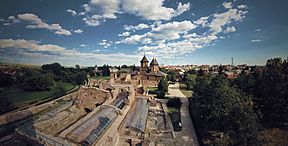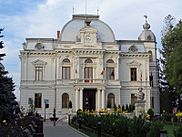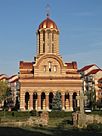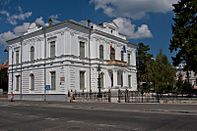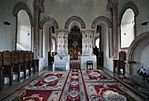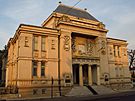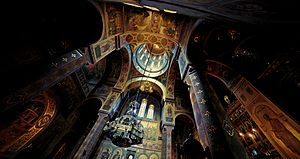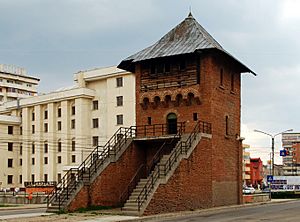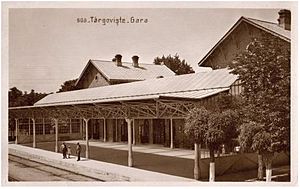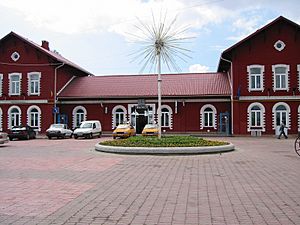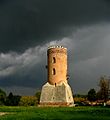Târgoviște facts for kids
Quick facts for kids
Târgoviște
|
||
|---|---|---|
|
Left to right, top to bottom: Târgoviște Princely Court, City Hall, Ascension Metropolitan Church, Art Museum, Chindia Tower, Stelea Monastery, History Museum
|
||
|
||
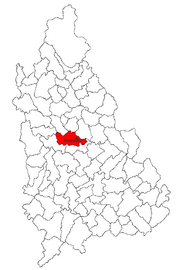
Location in Dâmbovița County
|
||
| Country | ||
| County | Dâmbovița | |
| Area | 50.4 km2 (19.5 sq mi) | |
| Elevation | 292 m (958 ft) | |
| Population
(2011)
|
Lua error in Module:Wd at line 1,575: attempt to index field 'wikibase' (a nil value). | |
| Time zone | EET/EEST (UTC+2/+3) | |
| Postal code |
130002–130169
|
|
| Area code | (+40) 02 45 | |
Târgoviște is a city in Dâmbovița County, Romania. It is the main city of the county. You can find it about 80 kilometers (50 miles) north-west of Bucharest. The city sits on the right bank of the Ialomița River.
Târgoviște was once a very important city in the history of Wallachia. It served as its capital city from 1418 to 1659. In 2021, the city had about 66,965 people living there. This makes it the 27th largest city in Romania.
Contents
What's in a Name?
The name Târgoviște comes from a Slavic word. This word means "marketplace." So, the name refers to a place where a market was held.
You can find similar names in other countries. For example, there are towns called Targovishte in Bulgaria and Trgovište in Serbia. There are also places with this name in different parts of Romania. The Romanian and Bulgarian towns with the same name are actually sister cities.
A Look Back in Time
Early Settlements
The first people to live in the Târgoviște area settled near where the Saint Nicholas-Geartoglu Church and Stelea Veche Church are today. Here, the first defenses were built. These included a small stone building with a brick wall and a moat (a ditch filled with water). This was likely built by a local ruler. However, we don't have much archaeological proof to know exactly when it was built.
Saxon Colonists Arrive
Another part of the city was built by Saxon settlers. They came from Transylvania around the late 1200s or early 1300s. They settled near the Catholic Saint Mary Church. A local story says this church was built in 1300. These colonists were allowed to settle there by the local ruler.
The Saxon settlers brought new ways of organizing the city. Târgoviște was the only town in Wallachia with some Transylvanian-style leaders. It even had a night watch to keep the peace. Under Mircea the Elder (1383–1419), Târgoviște became the third capital of Wallachia.
After 1400, the town grew bigger and more crowded. Both the Saxon and Romanian parts of the city had large homes. These homes often had cellars and special cocklestoves for heating. Many valuable items have been found, showing the town's wealth. One discovery was a hoard of 6,284 silver coins.
Wallachia's Capital City
In the 1400s, Curtea de Argeș was the capital of Wallachia. But Târgoviște was growing fast. By the end of the century, it became a second home for the Wallachian ruler. In 1396, a traveler named Johann Schiltberger mentioned both cities as capitals.
Eventually, the court moved permanently to Târgoviște in 1431. This happened under Alexandru Aldea.
While it was the capital, the Târgoviște Princely Court was always being improved. It had strong stone walls and a moat. New churches and towers were built. Vlad III Dracula (also known as "the Impaler") later added the famous Chindia Tower. This tower is now a symbol of the city.
From 1565, for the next 200 years, rulers sometimes chose Târgoviște and sometimes Bucharest as the capital. Târgoviște was often preferred by rulers who were friendly with Transylvania. During the 1400s and 1500s, Târgoviște was a major trading center. It traded a lot with Poland, Brașov, and Sibiu.
By the 1500s, most people in the city were Romanians. Some Saxons had moved away, and others had blended in. Greek traders also started to settle in the city.
As the capital, Târgoviște faced many attacks. In 1395, it was attacked and burned by Bayezid I. In 1457, Vlad III Dracula punished the townspeople for their actions. Some leaders were removed, and younger people were sent to help build his Poenari Castle.
In 1462, Vlad III stopped an Ottoman invasion from reaching the city. This was during a famous event called the night attack at Târgoviște. In 1476, the city was taken by Stephen V Báthory. Many other battles happened near the city. In 1597, the Hajduks of Mihai Viteazul won an important battle against the Ottoman Empire in Târgoviște.
Losing Importance
The capital was finally moved to Bucharest for good. This happened during the rule of Constantin Brâncoveanu (1688–1714). After this, Târgoviște became less important. Its economy slowed down, and its population decreased.
Modern Times
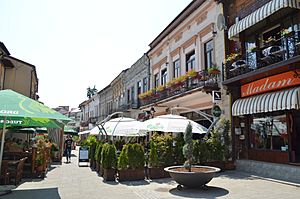
Târgoviște was the place where Tudor Vladimirescu was removed from power on June 7, 1821. This happened during the Wallachian uprising.
Later, in 1989, Târgoviște was the site of a very important historical event. This was during the Romanian Revolution, when the former leader of Romania, Nicolae Ceaușescu, and his wife Elena were removed from power.
City Layout
One small village, Priseaca, is part of the city's administration.
People of Târgoviște
In 2021, the city had 66,965 people. According to the 2002 census, most people (96.6%) were Romanians. About 2.84% were Roma people.
| Historical population | ||
|---|---|---|
| Year | Pop. | ±% |
| 1900 | 9,400 | — |
| 1912 | 13,041 | +38.7% |
| 1930 | 22,298 | +71.0% |
| 1948 | 26,038 | +16.8% |
| 1956 | 24,360 | −6.4% |
| 1966 | 29,763 | +22.2% |
| 1977 | 61,254 | +105.8% |
| 1992 | 98,117 | +60.2% |
| 2002 | 89,930 | −8.3% |
| 2011 | 79,610 | −11.5% |
| 2021 | 66,965 | −15.9% |
| Source: Census data | ||
Getting Around
By Train
Târgoviște is a railway node, meaning several train lines meet here. You can take trains to places like Titu.
Today, the city has several train stops:
- Târgoviște (south-west of the town)
- Romlux halt (north-west)
- Teiș halt (north)
- Târgoviște Nord station (north-east)
- Valea Voievozilor halt (east)
The main railway station is used for both passengers and goods. Other smaller stops serve the city's large factories.
By Road
Târgoviște is located where many old trade routes crossed. This makes it easy to reach from all directions. The city is about 80 kilometers (50 miles) north-west of Bucharest. It also has good access to Henri Coandă International Airport.
| Road number | Cities | |
|---|---|---|
| DN 71 | Tărtășești — Târgoviște — Pucioasa — Sinaia | |
| DN 72 | Găești — Târgoviște — Ploiești | |
| DN 72A | Târgoviște — Câmpulung |
Several county roads also pass through the city.
Public Transportation
In Târgoviște, you can get around using public transport buses and maxi-taxis. From 1995 to 2005, trolleybuses also ran in the city. In 2005, the public transport system was improved and made more modern.
City Friends Around the World
Târgoviște has sister city relationships with several cities:
 Castellón de la Plana, Spain
Castellón de la Plana, Spain Căușeni, Moldova
Căușeni, Moldova Corbetta, Italy
Corbetta, Italy Ciudad Real, Spain
Ciudad Real, Spain Gioia del Colle, Italy
Gioia del Colle, Italy Guilin, China
Guilin, China Karadeniz Ereğli, Turkey
Karadeniz Ereğli, Turkey Kazanlak, Bulgaria
Kazanlak, Bulgaria Nefteyugansk, Russia
Nefteyugansk, Russia Santarém, Portugal
Santarém, Portugal Targovishte, Bulgaria
Targovishte, Bulgaria 2nd district of Budapest, Hungary
2nd district of Budapest, Hungary
Sports Teams
The city has a football (soccer) club called FC Chindia Târgoviște. They play in the second-highest league of Romanian football, the Liga II.
Târgoviște is also home to the Municipal MCM Târgovişte basketball club. This team plays in the Romanian League and the EuroCup.
Famous People from Târgoviște
Many notable people were born in Târgoviște, including:
- Grigore Alexandrescu (1810–1885), a poet
- Sorana Cîrstea (born 1990), a tennis player
- Cornel Dinu (born 1948), a football player
- Ion Heliade Rădulescu (1802–1872), a writer and politician
- Theodor Stolojan (born 1943), an economist and politician
Images for kids
See Also
 In Spanish: Târgoviște para niños
In Spanish: Târgoviște para niños
 | Claudette Colvin |
 | Myrlie Evers-Williams |
 | Alberta Odell Jones |


